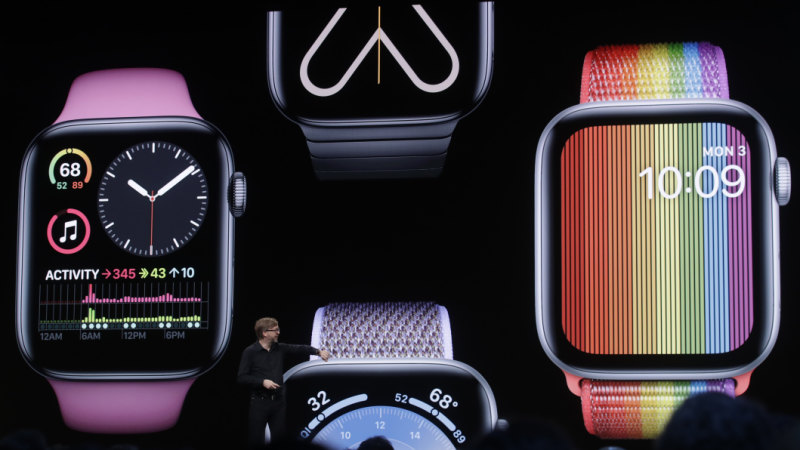Tim Cook is not prone to outbursts of raw emotion, at least in public. But one of the few times he has come close occurred five years ago this week, when he unveiled Apple's long-awaited smartwatch to the world.
Tim Cook unveils the Apple Watch in 2014.Credit:Bloomberg
It was three years since he took over from Steve Jobs, and in that time Apple had released no magic product to match the iPhone, iPod or iPad that his predecessor had masterminded. The fabled "iWatch" was the first to be developed in the post-Jobs era and as a result, was the subject of intense interest from investors as well as customers.
So when it was finally announced, Cook allowed himself some catharsis, punching the air triumphantly as he strode on stage, his sleeves rolled up to display the device on his wrist.
That triumph, as it turned out, was premature. It was not until the following year that the Apple Watch was actually released. Initial sales were meagre compared to analysts' forecasts, even allowing for the fact that the iPhone's success had created impossibly high expectations.
New faces and features are arriving for the Apple Watch, along with its own store.Credit:AP
Last week I rewatched the device's 2014 unveiling, and it was striking how Apple, a company that prides itself on a telepathic alignment with its customers, was so wrong about how its new invention would actually be used.
Executives demonstrated hotel doors being unlocked using the Watch, friends scribbling each other finger-drawn messages on its tiny screen, and showed how a Twitter app could scroll through posts one-by-one. None of these features have caught on (Twitter abandoned its official Apple Watch app in 2017).
In a doomed attempt to appeal to Rolex buyers, Apple released 18-carat gold versions costing more than £10,000 and gave them to fashion icons like Karl Lagerfeld, in what always seemed like a stunt than a real sales strategy.
At the beginning, it was hard to say what the Apple Watch was for, and it was unclear that even Apple's own bosses knew.
Internally, executives are said to have been unsure whether to pitch it as a fashion accessory or a utilitarian fitness device, and ended in a hazy middle.
Within a year of its release, obituaries were being written for the Apple Watch. In one dismal quarter, sales fell 70pc.
New gadgets rarely come out of the gates fully formed; technology is an iterative process. The problem for Cook was that the company's previous products had delighted instantly. The appeal of the iPod and iPhone were obvious.
The Watch, by contrast, has been that rare thing for Apple: a slow burner. Unlike its predecessors, which were close to the finished item when launched, the original Apple Watch felt like a prototype, one that has since developed out in the open.
More recent versions have dramatically improved. Apple has dispensed with any pretence of the Watch being a luxury good, and stopped attempting to squeeze aspects of the iPhone onto its small screen.
Instead it has doubled down on the device's fitness and health potential, adding features such as GPS tracking and waterproofing.
Last year's model was the biggest leap into health yet, including an electrocardiogram that could accurately measure heart irregularities, and a fall detection system.
A new version of the Watch's software due to be unveiled this week is expected to include sleep monitoring and fertility tracking capabilities, and glucose and blood pressure monitoring have been suggested as future options.
For tech followers, new versions of the Apple Watch have now become far more interesting than the iPhone, whose upgrades have stalled in recent years.
The Apple Watch, then, serves as a microcosm of Cook's Apple: less immediately exciting, iterative, but quietly successful.
It could well be a blueprint for future products the company expects to launch, such as a set of augmented reality glasses that project holograms into a wearer's vision, slated for release as early as next year.
No product was ever going to match the iPhone, which made Apple the world's most profitable company and defined a decade. But the Apple Watch has certainly not been the failure it was once labelled.
Telegraph, UK
Source: Read Full Article


